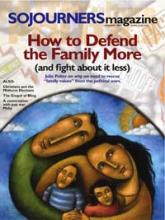The 2006 midterm elections mark a significant turning point from the Religious Right’s hold on evangelical voters. Moderate, and some conservative, Christians—especially evangelicals and Catholics—want a moral agenda broader than only abortion and same-sex marriage. The national exit polls showed 6 percent more Catholics and 5 percent more white evangelicals supported Democratic candidates in House races than in the 2004 elections. Eight percent fewer evangelicals voted for Republicans than did for President Bush in 2004. Many were concerned about poverty, the war in Iraq, strengthening families, and protecting the environment as important moral values.
An exit poll commissioned by Faith in Public Life and Catholics in Alliance for the Common Good and conducted by Zogby International showed why that shift occurred. Iraq was considered the “moral issue that most affected your vote” by 45.8 percent of voters, almost six times as many voters as abortion and almost five times as many as same-sex marriage. Iraq was the top moral issue among Catholics, born-again Christians, and frequent church attendees. Poverty and economic justice topped the list of “most urgent moral problem[s] in American culture.”
Bob Casey, a Catholic, pro-life Democrat, won a senate seat in Pennsylvania because his campaign took both religion and abortion off the table. And in Ohio, ordained Methodist minister Ted Strickland defeated the Religious Right’s favorite candidate, Kenneth Blackwell, for governor. Strickland’s authentic Christian faith made it impossible for Blackwell to claim that God was on his side (a traditional Republican assertion). When the Republicans failed to win a religious advantage in these races, other issues—such as the war in Iraq and the economy—helped to defeat the Republican candidates. Also in Ohio, Democrat Sherrod Brown defeated Sen.
Read the Full Article
